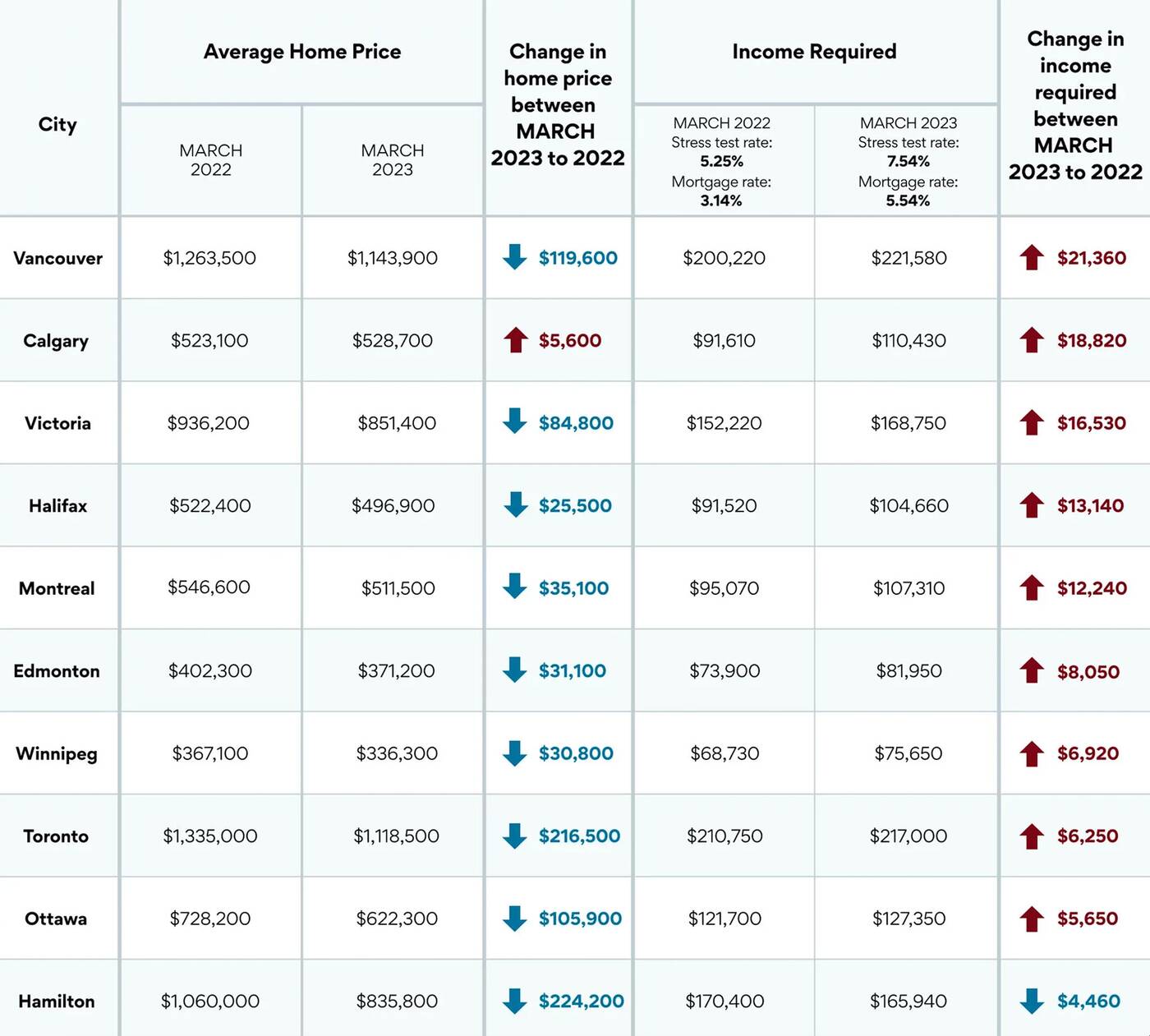How Much Money You Need To Buy A Home in Canada

You now need to make a lot more money per year to be able to afford a home in Canada, according to a new report from Ratehub.ca.
Even though home sales soared nationwide in March, so did the average sale price.
The Canadian Real Estate Association (CREA) reported that 41,636 homes were sold across Canada in March — a 1.4 per cent increase since February.
However, this number is still 34.4 per cent lower than what it was in March 2022. Home prices saw a 2 per cent increase compared to the beginning of 2023, averaging a whopping $686,371.
Earlier this month, the Bank of Canada announced its second interest rate update of the year, deciding to hold the rate at 4.5 per cent, which is still very high for a lot of aspiring homebuyers.
Ratehub.ca's analysis, released today, found that high mortgage rates "continue to wipe out any price relief offered by lower home values."
The minimum annual income required to buy an average home in major Canadian cities has skyrocketed since last year. As a result, home affordability appears to have worsened in nine out of ten cities surveyed.
Depending on where they want to shop, Canadians now need to earn a surplus of between $5,650 and $21,360 yearly to make their dream of buying a home a reality. Ratehub.ca also expects this trend to worsen "given tightening sellers' market conditions."
"This was largely fuelled by price recovery in the Greater Toronto Area and BC Lower Mainland; stripping these regions out would reduce the national average by $136,000," Ratehub.ca's report reads.
The national stress test and mortgage rates in March last year were 5.25 per cent and 3.14 per cent, respectively — they now stand at 7.5 per cent and 5.54 per cent.
Here’s the lowdown on how much extra money you'll need to make in your city to buy a place of your own.
Vancouver
In March of 2022, the average home price in Vancouver was $1,263,500. This year, that number fell to $1,143,900, exhibiting a decrease of $119,600.
However, considering stress test rates and mortgaging, the minimum income required to brave the pressures of home buying has increased by $21,360 (from $200,220 to $221,580). This is the most significant increase in minimum required income of all the cities in Ratehub’s report.
Victoria
The average home price in Victoria fell by $84,800 between March 2022 and March 2023 and now stands at $851,400. This was the third-largest decline in home prices of all the cities studied by Ratehub.ca.
You’ll need to earn $16,530 more than the minimum required to make this happen last year — from $152,220 to $160,750.
Calgary
Calgary is the only major city surveyed by Ratehub.ca where the average home price spiked, but luckily, not too much. It went from $532,100 to $528,700 — an increase of $5,600.
The minimum yearly income to afford this soared, however, going from five digits ($91,610) to six ($110,430) between March 2022 and March 2023.
That’s an increase of $18,820.
Edmonton
Edmonton home prices saw the second-smallest dip across the cities surveyed, following Halifax’s $25,500 decrease. Average home prices in Edmonton have dropped by $31,100 (from $402,400 last year to $371,200).
If you’re considering buying a home, you must make at least $81,950 per year, an $8,050 increase from a doable $73,900 last year.
Montreal
The average home in Montreal will cost you $511,500, per March 2023 data. This price was significantly higher at $546,600 last year.
Like Calgary, the minimum income required to buy a home went from five digits ($95,070) to six ($107,310), increasing by $12,240.
Toronto
Toronto saw the most significant average home price decrease in all 10 cities Ratehub.ca analyzed, going from $1,335,000 to $1,118,500. That’s a dip of $224,200.
You’ll need to make more money yearly, but not by that much compared to most other cities. Still, the figure is mind-bogglingly large — $217,000 per year, just shy of Vancouver’s $221,580.
Last year, Toronto homebuyers would have needed at least $270,750 in income to buy a home. So if you can find a way to make an additional $6,250 per year, you’re in a good place to buy a home.
Hamilton
Of all the cities studied by Ratehub.ca, the only one where the minimum income required to buy a home fell this year was Hamilton.
Last year, you would’ve needed a yearly cheque of $170,400 to make your homebuying dreams a reality. Now, you need $165,940. That’s a drop of $4,460.
Hamilton was also the top city for decreased home prices — a shocking $224,200. The average home would’ve cost you $1,060,000 in March 2022, but as of March this year, this figure has fallen to $834,800.
To see what’s happening in the rest of Canada, read Ratehub’s full report here.
Data in Ratehub’s chart below is based on a mortgage with a 20% down payment, 25-year amortization, $4,000 annual property taxes, and $150 monthly heating. Mortgage rates are the average of the Big Five Banks’ five-year fixed rates in March 2023 and March 2022.

Source: Ratehub
BlogTO(Daily Hive, April 18,2023)







